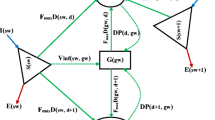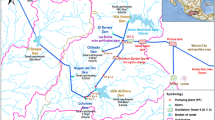Abstract
Water allocation in a competing environment is a major social and economic challenge especially in water stressed semi-arid regions. In developing countries the end users are represented by the water sectors in most parts and conflict over water is resolved at the agency level. In this paper, two reservoir operation optimization models for water allocation to different users are presented. The objective functions of both models are based on the Nash Bargaining Theory which can incorporate the utility functions of the water users and the stakeholders as well as their relative authorities on the water allocation process. The first model is called GA–KNN (Genetic Algorithm–K Nearest Neighborhood) optimization model. In this model, in order to expedite the convergence process of GA, a KNN scheme for estimating initial solutions is used. Also KNN is utilized to develop the operating rules in each month based on the derived optimization results. The second model is called the Bayesian Stochastic GA (BSGA) optimization model. This model considers the joint probability distribution of inflow and its forecast to the reservoir. In this way, the intrinsic and forecast uncertainties of inflow to the reservoir are incorporated. In order to test the proposed models, they are applied to the Satarkhan reservoir system in the north-western part of Iran. The models have unique features in incorporating uncertainties, facilitating the convergence process of GA, and handling finer state variable discretization and utilizing reliability based utility functions for water user sectors. They are compared with the alternative models. Comparisons show the significant value of the proposed models in reservoir operation and supplying the demands of different water users.
Similar content being viewed by others
References
Araghinejad S, Burn DH, Karamouz M (2006) Long-lead probabilistic forecasting of streamflow using ocean-atmospheric and hydrological predictors. Water Resour Res 42:1–11. doi:10.1029/2004WR003853
Bannayan M, Hoogenboom G (2008) Predicting realization of daily weather data for climate forecasts using the non-parametric nearest-neighbor re-sampling technique. Int J Climatol 28(10):1357–1368. doi:10.1002/joc.1637
Burn DH, Yulianti S (2001) Waste-load allocation using genetic algorithms. J Water Res Plan Manage 127(2):121–129. doi:10.1061/(ASCE)0733-9496(2001)127:2(121)
Celeste AB, Suzuki K, Kadota A (2008) Integrating long- and short-term reservoir operation models via stochastic and deterministic optimization: case study in Japan. J Water Res Plan Manage 134(5):440–448
Chang F, Hui S, Chen Y (2002) Reservoir operation using grey fuzzy stochastic dynamic programming. Hydrol Processes 16(12):2395–2408
East V, Hall MJ (1994) Water resources system optimization using genetic algorithms. In: 1st int. conf. on hydroinformatics, Balkema, Rotterdam, The Netherlands, pp 225–231
Eiger G, Shamir U (1991) Optimal operation f reservoirs by stochastic programming. Eng Opt 17:293–312
Galeati G (1990) A comparison of parametric and non-parametric methods for runoff forecasting. Hydrol Sci J 35(1):79–94
Ganji A, Khalili D, Karamouz M, Ponnambalam K, Javan M (2007) A fuzzy stochastic dynamic nash game analysis of policies for managing water allocation in a reservoir system. Water Resour Manage 22:51–66
Gen MR, Chang L (2000) Genetic algorithm and engineering optimization. Chichester: Wiley
Harsanyi JC, Selten R (1972) A generalized Nash solution for two-person bargaining games with incomplete information. Manage Sci 18:80–106
Hashimoto TJ, Stedinger R, Loucks DP (1982) Reliability, resiliency, and vulnerability criteria for water resources performance evaluation. Water Resour Res 18(1):14–20
Herrera F, Lozano M (2003) Fuzzy adaptive genetic algorithms: design, taxonomy, and future directions. Soft Comput 7(8):545–562. doi:10.1007/s00500-002-0238-y
Karamouz M, Houck M (1987) Comparison of stochastic and deterministic dynamic programming for reservoir operating rule generation. Water Resour Bull 23(1):1–9
Karamouz M, Mousavi SJ (2003) Uncertainty based operation of large scale reservoir systems: Dez and Karoon experience. J Am Water Resour Assoc 39(4):961–975
Karamouz M, Vasiliadis HV (1992) Bayesian stochastic optimization of reservoir operation using uncertain forecasts. Water Resour Res 28(5):1221–1232
Karamouz M, Szidarovszky F, Zahraie B (2003) Water resources systems analysis. Lewis, Boca Raton
Karamouz M, Ahmadi A, Moridi A (2009) Probabilistic reservoir operation using Bayesian stochastic model and support vector machine. Adv Water Res 32:1588–1600. doi:10.1016/j.advwatres.2009.08.003
Karlsson M, Yakowitz S (1987) Nearest-neighbor methods for nonparametric rainfall-runoff forecasting. Water Resour Res 23(7):1300–1308
Kelman J, Stedinger JR, Cooper LA, Hsu E, Yuan SQ (1990) Sampling stochastic dynamic programming applied to reservoir operation. Water Resour Res 26(3):447–454
Kember G, Flower AC (1993) Forecasting river flow using nonlinear dynamics, stochastic. Stoch Hydrol Hydraul 7:205–212
Kerachian R, Karamouz M (2006) Optimal reservoir operation considering the water quality issues: a stochastic conflict resolution approach. Water Resour Res 42:1–17. doi:10.1029/2005WR004575
Lall U, Sharma A (1996) A nearest neighbor bootstrap for resampling hydrologic time series. Water Resour Res 32(3):679–693
Mei-yi L, Zi-xing C, Guo-yun S (2004) An adaptive genetic algorithm with diversity-guided mutation and its global convergence property. J Cent South Univ Technol 11(3):323–327. doi:10.1007/s11771-004-0066-6
Michalewicz Z (1992) Genetic algorithms data structures evolutionary programs. Springer, New York
Nash JF (1950) The bargaining problem. Econometrica 18:155–162
Ostfeld A, Salomons S (2005) Hybrid genetic-instance based learning algorithm for CE-QUAL-W2 calibration. J Hydrol 310:122–142. doi:10.1016/j.jhydrol.2004.12.004
Pelikan M, Goldberg DE, Cantu-Paz E (2000) Linkage problem, distribution estimation, and Bayesian networks. Evol Comput 8(3):311–340
Richards A, Singh N (1997) Two level negotiations in bargaining over water, Game Theoretical Applications to Economics and Operations Research. Kluwer, Boston
Seifi A, Hipel KW (2001) Interior-point method for reservoir operation with stochastic inflows. J Water Res Plan Manage 127(1):48–57. doi:10.1061/(ASCE)0733–9496(2001)127:1(48)
Srinivas M, Patnaik LM (1994) Adaptive probabilities of crossover and mutation in genetic algorithms. IEEE Trans Syst Man Cybern 24(4):656–667
Stedinger JR, Sule BF, Loucks DP (1984) Stochastic dynamic programming models for reservoir operation optimization. Water Resour Res 20(11):1499–1505
Teegavarapu RSV, Simonovic SP (2001) Optimal operation of water resource systems: trade-offs between modeling and practical solutions. Integr Water Resour Manage, IAHS Red Book, 272, IAHS, pp 257–263
Todini E (2000) Real-time flood forecasting: operational experience and recent advanced. In: Marsalek J et al (eds) Flood issues in contemporary water management. Kluwer, Dordrecht, pp 261–270
Trezos T, Yeh WW-G (1987) Use of stochastic dynamic programming for reservoir management. Water Resour Res 23(6):983–996
Varian HR (1995) Coase, competition, and compensation. Japan World Econ 7(1):13–27
Wardlaw R, Sharif M (1999) Evaluation of genetic algorithms for optimal reservoir system operation. J Water Res Plan Manage 125(1):25–33
Author information
Authors and Affiliations
Corresponding author
Rights and permissions
About this article
Cite this article
Ahmadi, A., Karamouz, M. & Moridi, A. Robust Methods for Identifying Optimal Reservoir Operation Strategies Using Deterministic and Stochastic Formulations. Water Resour Manage 24, 2527–2552 (2010). https://doi.org/10.1007/s11269-009-9566-3
Received:
Accepted:
Published:
Issue Date:
DOI: https://doi.org/10.1007/s11269-009-9566-3




